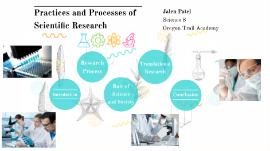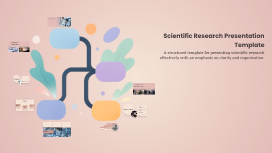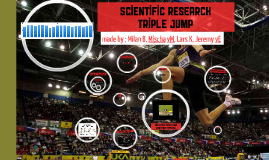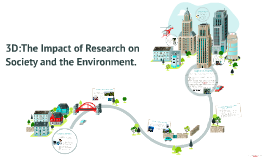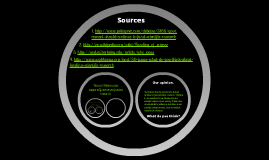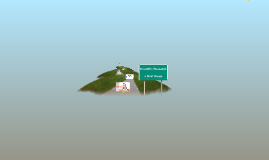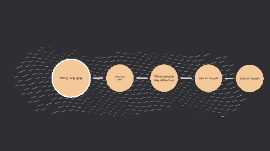Scientific Research
Transcript: Jalen Patel Science 8 Oregon Trail Academy Practices and Processes of Scientific Research Throughout the unit, we learned: Ways in which scientific research is conducted How social forces influence scientific priorities How basic scientific research may, or may not, support medical applications for human health Introduction Introduction Current research builds on prior understanding. Scientific and educational priorities are influenced by the health concerns of the time. Science Through The Centuries Science Through the Centuries There are two kinds of research: Basic and Applied Basic Research Applied Research Should citizens determine funding for scientific research? Who Should Decide? Who Should Decide? Research Process Collaboration Researchers need to collaborate with each other to complement their knowledge and skills, and expand the data they can utilize in a publication. Scientists often discuss and refine their methods in collaboration with others Includes sharing initial data, reviewing other methods, and to give critical feedback in order to redesign the existing protocol for the next set of trials. Scientists have built upon and revised each other’s work Working together with others toward a goal Company that makes everything from batteries to shampoo was founded by two brothers-in-law. William Procter was a candlemaker from England and James Gamble was a soapmaker from Ireland. P & G is a great example of a company that was formed through collaboration between two individuals, with only two products at first. Eventually, they diversified into a wide range of products being sold worldwide. Procter & Gamble Procter & Gamble Role of Science and Society Citizens and social needs influence research directions The biomedical research process requires active participation by scientists, consumers, clinicians, citizens, and research participants. Scientific research can be based on citizens' needs Citizens should have input on research projects In Science Through the Centuries, we saw that scientific priorities are influenced by the social and health concerns of the time. There is new technology released during each century. As the medical/research community learned more about the cause of diabetes, targeted treatments could be developed. Historical Example Historical Example Scientific research is not only about advancing knowledge, but also about responding to the most important challenges facing citizens. Citizens and Challenges Translational Research Ethical Guidelines There are ethical guidelines that scientists follow in every stage of research. Basic Research: Scientists and researchers at every level are trained in the ethical conduct of research which entails the use of and need for: collaboration, peer review, multiple trials, skepticism, and rules against falsifying data. Animal Research: People working with animals follow The 3 Rs as ethical guidelines. Replacement Replacement Replacing conscious, living vertebrates with cell or tissue cultures, computer models, simulation models, and/or less developed animal species to the extent possible. Reduction Reduction Using the fewest number of animals possible in a research project to gain valid results. Refinement Refinement Using any technique or procedure that minimizes distress or enriches the life of an animal used in research. Also, FDA requires that research results are reviewed and approved before releasing a drug to the market. FDA Example The Food and Drug Administration (FDA) requires information on the results of animal studies, manufacturing information, and procedures for upcoming clinical trials before humans can be used in drug research. Conclusion Conclusion We have roles and responsibilities as science students, members of society, users of medications, potential taxpayers, and future voters Research may lead to studies involving both animals and humans and may come to the availability of new treatments and medications. Being a Scientifically Literate Citizen Scientific literacy is the knowledge and understanding of scientific concepts and processes. My actions in multiple settings will reflect knowledge of the process of scientific research. Scientific Literacy Scientific Literacy Thank You Thank You!






